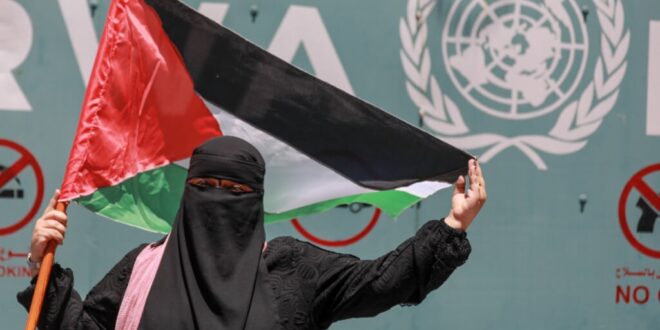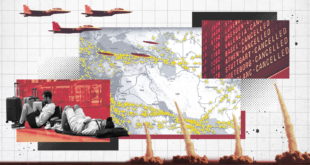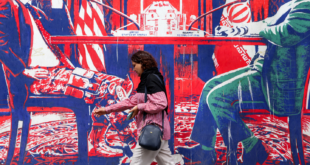Western nations must not continue to contribute to a UN agency that is effectively controlled by a terrorist organization.
Last week, Australian foreign minister Penny Wong indicated that Canberra may soon resume government funding to the United Nations Relief and Works Agency for Palestine Refugees in the Near East (UNRWA), despite mounting evidence that the organization is a Hamas subsidizer, employer, and collaborator. The agency has long been a focus of criticism and controversy, but funding was at last suspended by Australia, the UK, the US, and other donor countries following allegations that 12 UNRWA employees were involved in the October 7 massacre of Israeli civilians last year.
However, if Australian funding of UNRWA is resumed, and if other donors follow suit, it would be a disaster—not just for Israel, but for Palestinians, too. Wong claims that only UNRWA is able to distribute humanitarian assistance to Palestinians living in Gaza, but there are many alternatives. If the Australian government wants to prevent another October 7 massacre and support the dignity of the Palestinian people, it will end its support of UNRWA for good and send money instead to the alphabet soup of agencies capable of replacing it.
Addressing the myriad challenges presented by UNRWA starts by recognizing what UNRWA is and what it is not. UNRWA is not a refugee agency. What began as a political weapon in the Arab world’s campaign to destroy the State of Israel after its founding has evolved into an internationally funded, locally staffed foreign-aid entitlement program that incites violence against Israel, subsidizes US-designated foreign terrorist organizations, denies Palestinians their basic human rights, and blocks the pathways to a sustainable peace between Israel and the Palestinians.
Following Israel’s declaration of independence in 1948—authorized by the United Nations the previous year—Arab armies declared an eliminationist war on the new Jewish state, vowing to push the Jews into the Mediterranean Sea. During the ensuing violence, an estimated 700,000 Arabs fled their homes. Some were fearful of the war, some did not want to live under an Israeli flag, and others were persuaded by Arab propaganda that they would be able to return as soon as the Jews were defeated. At the same time, Arab governments expelled roughly the same number of Jews as punishment for Israel’s establishment.
No agency exists to look after the Jews who fled Arab countries in 1948 because those refugees were absorbed by Israel and Western countries as quickly as possible. But Arab refugees produced by the Arab invasion of Israel were not so fortunate. While the UN High Commissioner for Refugees (UNHCR) was established in 1949 to serve the world’s displaced persons and help them move to post-refugee status, Arab regimes sought to maintain a restive Arab refugee population in anticipation of Israel’s eventual destruction. To look after this displaced population in limbo, the UN established UNRWA in 1950. To this day, it is the only UN organization with a purported refugee mission separate from UNHCR.
UNRWA’s mandate was and remains quite different from that of the High Commissioner. By keeping people in refugee status indefinitely, the agency is raising generation after generation to believe that their “manifest destiny” is to return to modern-day Israel. Becoming a citizen of another country like Jordan, or even the United States, does not remove the refugee label. Nor does living within jurisdictions where Palestinians have already declared a state. Refugeehood does not stop at children born in refugee camps—it has become an inherited right passed on indefinitely, growing an initial population of 700,000 to a supposed refugee pool today of 5.9 million, all of whom continue to insist on their “right of return.”
The population of Gaza is now 2.1 million, 1.7 million of whom UNRWA lists as refugees. But this absurd statistic is intended to advance a political agenda, not reflect reality. These people have lived in Gaza for generations, under Egyptian, Israeli, and then Hamas control, in what the media calls “urban refugee camps.” The term “refugee camp” evokes images of temporary tents and trailers, but these are just UN-subsidized neighborhoods in cities.
The goal is not to improve people’s lives; it is to keep them in a state of insecurity and instability for which they are encouraged to hold Israel responsible. This is the only reason UN officials and some Western political leaders falsely claim that no alternatives exist. There is no shortage of aid agencies in the world capable of triaging crisis on a moment’s notice. The United States, Australia, and many countries fund such efforts whenever the need arises. But UNRWA is the only agency with a mandate to preserve a phony narrative of Palestinian refugeehood that sustains political warfare against Israel.
Today, UNRWA raises children to internalize the genocidal slogans you see in street protests around the world—only they will be perpetrators of the genocide, not just its cheerleaders. In that respect, UNRWA is irreplaceable, and the October 7 massacre was the logical upshot of its mandate and indoctrination.
Corrupt and Unaccountable
UNRWA has no board of directors. Its donors cannot elect the agency’s commissioner general or vote to change its mandate and policies. Nor does UNRWA submit to independent audits outside the UN system, which means that donors are unable to verify basic information. Governments that run big entitlement programs regularly perform integrity audits to root out fraud and abuse. UNRWA does not. The US Congress once allocated $1 million to fund a private-sector audit, but UNRWA refused to cooperate. UNRWA claims to serve 5.9 million people, but there are good reasons to doubt the accuracy of that figure. The government of Lebanon, for example, has previously accused UNRWA of inflating its numbers, after a census found just 174,422 Palestinians out of a reported population of 450,000.
In 2019, reports emerged of “credible and corroborated” corruption allegations against senior UNRWA personnel. In an internal review that leaked to the press, UNRWA detailed “sexual misconduct, nepotism, retaliation, discrimination, and other abuses of authority” among its top brass. UNRWA’s then commissioner-general Pierre Krahenbuhl resigned in the aftermath of an internal investigation. That Krahenbuhl was just appointed to lead the International Committee of the Red Cross indicates that there is no accountability for corruption.
UNRWA claims it will soon run out of money if countries continue a pause on their contributions. But the agency is the UN equivalent of the boy who cried wolf. The US—UNRWA’s largest donor at 25 percent of its budget—halted all contributions from 2018 to 2021, and the organization did not collapse. Yet after President Joe Biden resumed UNRWA funding with hundreds of millions of dollars per year, the agency continued to issue emergency appeals.
Indeed, UNRWA’s budget has exploded in recent years. From 1950 to 2018, the US contributed $6 billion. Since 2021, Washington has sent more than $1 billion. That is a massive expansion in budget and an unsustainable trajectory for any donor. From a simple taxpayer-accountability and good-government perspective, UNRWA is one of the most suspect spending programs in the world. If that were where criticism ended, it would be enough to demand a comprehensive overhaul and rethinking of aid. But this is only where the problems begin.
Structural Support for Terrorism
UNRWA has a terrorism problem underwritten by taxpayers from donor countries. In addition to the 12 UNRWA employees who reportedly participated in the October 7 massacre, ten percent of the agency’s 13,000 employees in Gaza are members of a terrorist organization. Half of those employees have at least one terrorist family member.
UNRWA’s operations in the West Bank have also long been a hotbed of terrorism. The Israeli military routinely battles terror cells in UNRWA’s Jenin refugee camp, for example. And in Lebanon’s Ain al-Hilweh UNRWA camp—where there is no Israeli presence whatsoever—terrorist groups have been fighting each other for months, leaving at least 28 people dead and displacing families.
UNRWA’s enablement of terrorism is a feature of the agency, not a bug. Indeed, reports of UNRWA’s complicity in terror activity go back years. Media reports have exposed Hamas terror tunnels next to or under UNRWA facilities, and UNRWA schools have been used as rocket-launching platforms, with rockets even stored inside those schools.
News that UNRWA teachers kept Israeli hostages in their homes after October 7 comes as no surprise. In 2008, an UNRWA school headmaster was exposed moonlighting as an Islamic Jihad terrorist, but UNRWA didn’t fire him—he was eventually removed by an Israeli air strike. Indeed, reporters and UN watchdog groups have identified thousands of UNRWA employees supporting terrorism and antisemitism in their social media and chat groups.
Years ago, as a congressional aide conducting oversight of UNRWA on Capitol Hill, I asked UNRWA officials why they allow terrorists to establish bases of operations in their communities. They claimed security was a host government’s responsibility, which in the case of Gaza means Hamas. It’s the same excuse UNRWA provides when it is asked why its school textbooks teach incitement against Jews. Talk to the host government, they say as they demand more international dollars. For UNRWA, every problem is someone else’s responsibility, yet the requests for more money continue without any independent oversight.
UNRWA is structured to have a terror problem. The United Nations does not recognize Hamas, Islamic Jihad, Hezbollah, or the Popular Front for the Liberation of Palestine as terrorist groups, even though each is designated a terror group by most Western countries. And since UNRWA is a UN-mandated agency, it does not recognize these groups as terrorist organizations, either.
To UNRWA, Hamas and Islamic Jihad are political groups and the agency says it doesn’t discriminate based on politics. Since UNRWA is not an international organization but a local welfare agency that employs 30,000 Palestinians and provides benefits to millions more, it is certain that UNRWA employs, contracts with, and gives money or services to members of designated foreign terrorist organizations and their families.
As a result, Hamas has significant influence over UNRWA’s policies and operations in Gaza. After the 2021 Israel–Hamas war, UNRWA recalled its Gaza director, Matthias Schmale, after he gave a media interview in which he credited the Israeli military for its precision targeting. Schmale knew a thing or two about Hamas tunneling operations around UNRWA facilities, too. A few months after his removal, he told NPR News, “Many people told me through my four years, there’s tunnels everywhere and it’s a safe assumption.” Anyone who claims today that UNRWA was not aware of the Hamas terror infrastructure around its facilities is not telling the truth.
The US Government Accountability Office told Congress more than 20 years ago that existing laws and policies were insufficient to prevent UNRWA funds from going to terrorism. Yet UNRWA is still not required to submit its staff, contractors, or beneficiaries for counterterrorism vetting. At this late date, no one should be shocked to learn that UNRWA is fully complicit in the Hamas terror infrastructure in Gaza, its war crimes, and crimes against humanity. This horror movie has been decades in the making, meticulously documented and co-produced by Western taxpayers.
According to the Associated Press, from 2014–20, UN agencies spent nearly $4.5 billion in Gaza, including $600 million in 2020 alone. More than 80 percent of that funding was channeled through UNRWA. With roughly 30 percent of UNRWA’s client population in Gaza, and $1 billion provided to UNRWA by the United States alone since 2021, the US alone added another $300 million to Hamas’s subsidized budget over the last three years.
And what did we get for this investment? Miles of terror tunnels. Thousands of rockets. The October 7 massacre. Throwing more money at UNRWA is a recipe for more of the same.
What’s the Alternative?
Faced with the indisputable evidence of UNRWA’s collaboration with Hamas and complicity in the October 7 massacre, UN officials (and political leaders like Foreign Minister Wong) push back on the notion of cutting off funding for UNRWA by claiming there is no alternative mechanism to deliver aid to Palestinians in need. By ending aid to UNRWA, they claim, millions might die of hunger and disease.
But the world already has an agency dedicated to the distribution of food assistance in areas of crisis and war zones—the World Food Program, which is on the ground in Gaza. The World Health Organization is dedicated to the distribution of medical assistance in conflict zones. UNICEF is dedicated to helping children in need. And, of course, the UNHCR is a massive agency with international staff and decades of experience coordinating relief for internally displaced persons in war zones at a moment’s notice, with fewer staff than UNRWA around the globe to serve tens of millions more than UNRWA’s client population.
The idea that there is no alternative to UNRWA simply because UNRWA is the current provider of certain services and aid is as ludicrous as claiming there is no alternative to Hamas because Hamas runs the Gaza health ministry. Those calling UNRWA indispensable would never say the same about Hamas, at least not in public. So why have the leaders of all the UN agencies that constitute the alternatives to UNRWA signed a joint statement opposing any halt in funding to UNRWA? Their UN overlords have told them to do so because the Palestinian cause, including the refugee mythology, is deeply embedded in the UN bureaucracy.
Every year, the UN condemns Israel more than any other country, as if most of the world’s problems are Israel’s fault. There are several other Palestinian organizations authorized by the UN that serve no purpose other than waging political and economic warfare against Israel. The UN Human Rights Council is the tip of the spear for global antisemitism.
But the UN doesn’t get to dictate US security policy, nor should it ever be allowed to dictate where our donor money goes. On the contrary, the UN goes where its donors tell them to go—that’s how a donor–agency relationship is supposed to work. If Washington and its allies around the globe join forces to insist on a quick transition from UNRWA to the countless agencies available to handle aid distribution in Gaza, the UN will have little choice but to comply.
A Better Way Forward
Western nations must not set a precedent that condones contributions to a UN agency that is effectively controlled by a terrorist organization. Western donor countries would never tolerate a UN organization that collaborates with, employs, contracts with, and provides benefits to Al Qaeda or ISIS. Nor would they ever again fund an agency whose members actively took part in events like September 11. Why then should its leaders today justify the same for Hamas when a better way forward exists?
First, donors to UNRWA should make clear to the UN secretary general that they are prepared to redirect all UNRWA donations to alternative agencies capable of performing key functions needed in the short term: delivering food and medicine, providing temporary shelter, and planning for the displaced population to return home after Hamas falls. If the UN refuses, the blame for any suffering that comes to the people of Gaza will fall on the secretary general, not on countries offering large sums to fund humanitarian aid.
Second, a counterterrorism vetting process should be established for replacement agencies to help screen would-be local contractors for Hamas or other terror affiliation. The US Agency for International Development long ago set up a vetting system like this for work in Palestinian areas. UN agencies should be using a similar process to ensure that funding is not diverted to US-designated terror groups, even if they are not recognized as terrorist organizations by the United Nations.
Third, because UNRWA also operates outside Gaza, plans must be implemented for transitioning the agency in the West Bank, Jordan, Lebanon, and Syria. A Gaza-like transition to UNHCR and other aid agencies may work in Lebanon and Syria. Anyone registered as a refugee who holds citizenship in another country or who resides within the territory of a self-declared Palestinian state should no longer be the ward of any UN refugee agency. If Jordan requires additional budget support to sustain services for UNRWA’s two million so-called refugees living there, increased bilateral assistance should be part of a broader conversation about Amman’s incitement against Israel and its refusal to extradite an FBI Most Wanted terrorist. A similar conversation will be needed in Ramallah, where no aid can flow while the Palestinian Authority pays people to commit terrorist attacks against Israel and incites its population to violence.
Finally, all aid—bilateral or multilateral—must be conditioned on the education system rooting out antisemitism and glorification of terrorism. Western donors should have the final say on textbooks and curriculum being funded with their dollars. Indeed, to stop the next generation from growing up to commit another October 7 massacre, reforming education may be among the highest priorities.
Australia’s foreign minister claims there is no alternative to UNRWA. The truth, however, is that in the wake of the largest massacre of Jews since the Holocaust, and the abundant evidence of UNRWA’s complicity, there is no alternative to ending UNRWA for good.
 Eurasia Press & News
Eurasia Press & News



